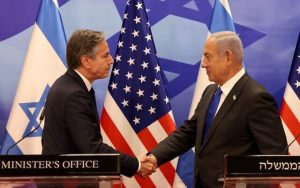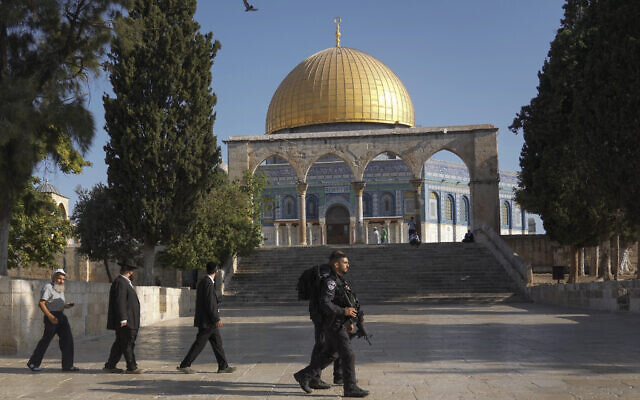Biden officials once again fear holiday season will lead to uptick in tensions, particularly in Jerusalem, with Sullivan and Blinken raising concerns during Jerusalem visits
For the second straight year, the Biden administration has circled the Muslim holy month of Ramadan as a potential accelerant for another eruption in violence between Israelis and Palestinians.
Senior US officials used their visits to Jerusalem over the last two weeks to urge Israel to take preemptive steps in the coming weeks in order to ensure that the sensitive period does not feature more bloodshed, two US and Israeli officials told The Times of Israel on Thursday, speaking on condition of anonymity.
The holy month is slated to begin around March 22.
Talks on efforts to defuse tensions are still in their early stages and there were no specific requests made of Israel by White House National Security Adviser Jake Sullivan, who visited last week, and Secretary of State Antony Blinken, who was in town this week, the Israeli official said.
However, the top Biden aides made clear that the issue is a matter of concern for the US and they asked their Israeli counterparts how they plan to address the matter.

US Secretary of State Antony Blinken and Israeli Prime Minister Benjamin Netanyahu shake hands during a press conference, on January 30, 2023 in Jerusalem. (Photo by RONALDO SCHEMIDT / POOL / AFP)
The US official said that a particular emphasis was placed during Sullivan and Blinken’s meetings on them confirming that Israel will ensure adherence to the status quo at Jerusalem’s Temple Mount, which sees an uptick in Palestinian visitors during Ramadan.
“There’s reason to assume that the violence this year will be worse, given that the new Israeli government is more emboldened to act punitively, but Prime Minister Netanyahu is also keen on keeping things calm so that he can focus on Iran and Saudi normalization and that will impact his calculus,” said a former US official familiar with the matter.
The Israeli official said that Prime Minister Benjamin Netanyahu in both meetings assured the Biden administration that he would not allow violations of the unwritten policy, under which Muslims are permitted to pray at the Temple Mount while non-Muslims can only visit during limited windows.
But according to the Israeli official, the US did not ask Netanyahu to block National Security Minister Itamar Ben Gvir from paying a repeat visit to the flashpoint compound. His tour of the site last month sparked a whirlwind of condemnations from across the globe.
US Special Envoy for the Palestinians and US Assistant Secretary of State for Near Eastern Affairs Hady Amr stayed behind after Blinken left on Tuesday for talks with Israeli and Palestinian officials in an effort to come away with a series of steps that can be implemented in the coming weeks to deescalate tensions, the US official said.
The former official, who previously served in a Democratic administration, said that the US “will have to aim low in terms of what it can accomplish.”
The source explained that the Palestinian Authority has “a list of ten unilateral steps” it opposes in East Jerusalem and the West Bank, much of which Netanyahu’s government is unlikely to halt.
The list includes settlement construction, outpost legalization, Israel Defense Forces raids into PA-controlled Area A of the West Bank and violations to the status quo at the Temple Mount.
While the PA urged the US to coax a commitment from Israel to cease such actions, the former US official said such “public guarantees” from Netanyahu’s new hardline government would be “highly unlikely.”
Biden officials held similar conversations with their Israeli and Palestinian counterparts in the months leading up to Ramadan last year. At the time, officials were worried that the confluence of Ramadan, Passover and Easter over the same period could ratchet up religious friction.
Then too, the US urged Israel to take preemptive steps to maintain calm before and during Ramadan, such as freezing evictions and home demolitions along with easing police presence in and around the Old City.
At the time, Israel was led by former prime ministers Naftali Bennett and Yair Lapid, whose moderate unity government took pains to align with Washington.
A year earlier, tensions loosely linked to Ramadan snowballed until the outbreak of war between Israel and Hamas in Gaza and rampant street violence in mixed Jewish-Arab cities.
The lead-up to Ramadan 2022 still saw significant bloodshed, including March terror attacks in Beersheba, Hadera and Bnei Brak in which 11 Israelis and foreign nationals were killed. Four more civilians were killed in shooting attacks in Tel Aviv and the Ariel settlement toward the beginning and end of the holy month.
Four more people were killed in a stabbing attack in Elad days after Ramadan, including one person who succumbed to wounds on Wednesday. That attack had coincided with Israel’s Independence Day.
During roughly that same period — from late February through late May of 2022 — 57 Palestinians were killed by Israeli forces, according to the UN. Most, but not all, of those deaths took place during clashes with troops or IDF raids of Palestinian towns. TIMES OF ISRAEL




